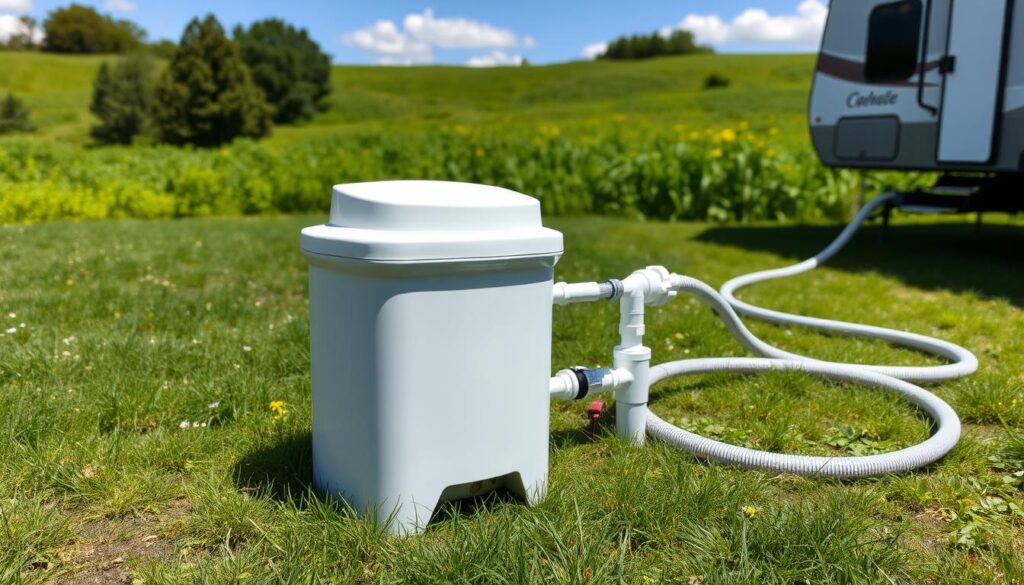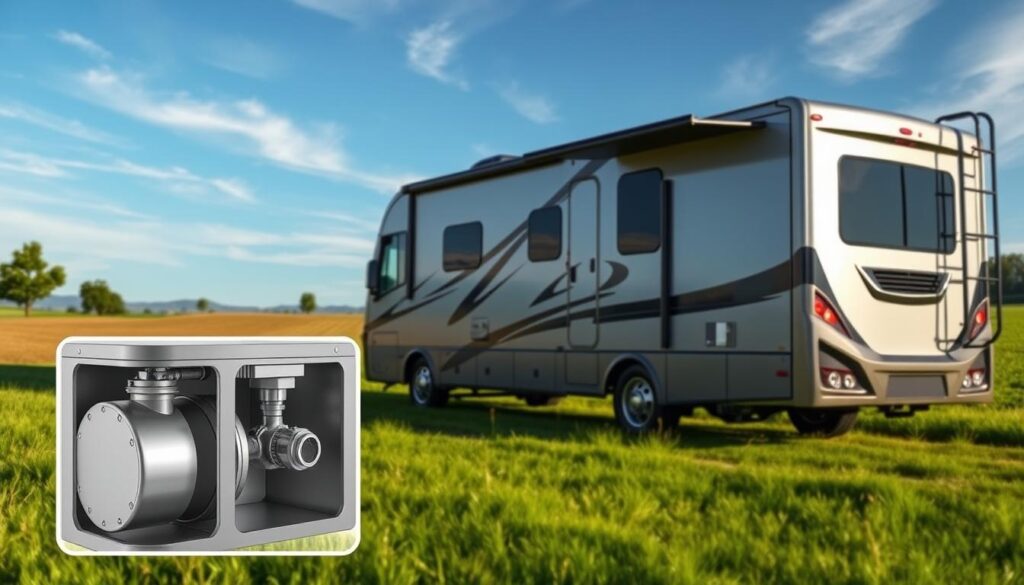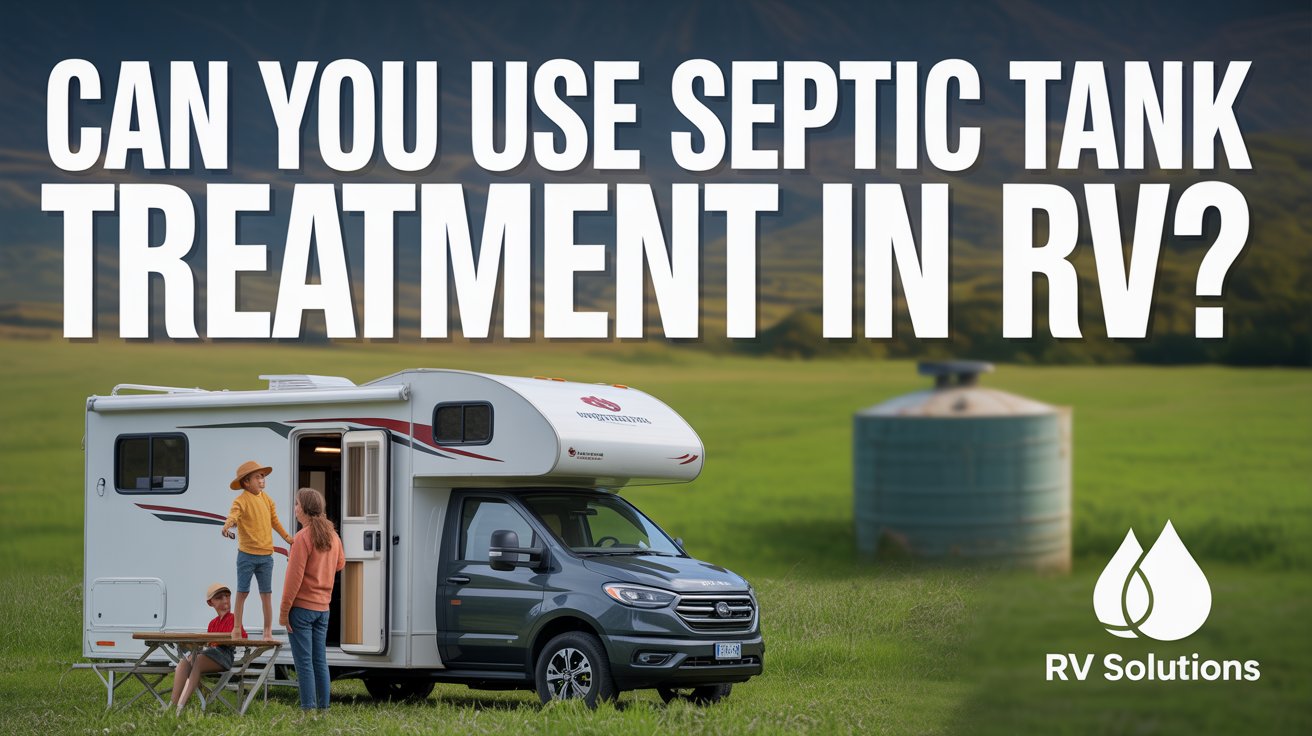As an RV owner, you’re likely aware of the importance of proper waste management. But have you ever wondered about the impact of your RV’s wastewater on the environment and septic systems?
Research from the University of Minnesota’s Onsite Sewage Treatment Program found that RV wastewater contains high levels of biochemical oxygen demand (BOD) and phosphorous, posing concerns for RVers and RV park owners alike.
So, what’s the solution? Using the right septic tank treatment can make a difference. But is it safe for your RV?
Key Takeaways
- RV wastewater can harm septic systems and the environment.
- Proper waste management is crucial for RVers.
- Septic tank treatments can help mitigate the issue.
- Not all septic tank treatments are suitable for RVs.
- Choosing the right treatment is essential.
Understanding RV Waste Systems
Understanding the intricacies of RV waste systems is crucial for effective waste management. RVs have unique waste management needs due to their portable nature and varying usage patterns.
Black Water vs. Gray Water Tanks
RV waste systems consist of two main types of tanks: black water and gray water. Black water tanks store sewage and waste from the toilet, while gray water tanks hold wastewater from sinks, showers, and sometimes washing machines. The distinction between these two is crucial because they require different handling and treatment approaches.
According to the University of Arizona Cooperative Extension, RV holding tank treatments can harm septic systems if they contain toxic chemicals. This highlights the importance of choosing the right treatment for your RV’s waste system.
How RV Waste Systems Differ from Home Septic Systems
Unlike home septic systems, RV waste systems are designed to be portable and self-contained. They lack the complex drainage fields found in traditional septic systems. Instead, RVs rely on holding tanks that need regular emptying and maintenance.
| Characteristics | RV Waste Systems | Home Septic Systems |
|---|---|---|
| Nature | Portable, self-contained | Fixed, complex drainage field |
| Emptying Frequency | Regular, based on usage | Less frequent, based on capacity |
| Treatment Approach | Specialized treatments for holding tanks | Natural processes, sometimes aided by additives |
As RV Lifestyle experts emphasize, understanding these differences is key to maintaining a healthy and functional RV waste system.
What Are Septic Tank Treatments?
Septic tank treatments are products designed to maintain the health of your RV’s waste system. These treatments help break down waste and reduce odors, making your RV experience more pleasant. According to Dr. Sara Heger, some RV holding tank treatment products contain formaldehyde, which can harm bacteria helpful to septic tank systems. Therefore, it’s crucial to choose the right type of treatment.
Chemical-Based Treatments
Chemical-based treatments are designed to break down solid waste and reduce odors in RV holding tanks. They often contain strong chemicals that can be effective but may also have negative environmental impacts. It’s essential to use these products with caution and follow the manufacturer’s instructions to minimize potential harm to the tank and the environment.
Some chemical-based treatments contain formaldehyde, a known hazardous substance. RV owners should be aware of the ingredients in these products and consider the potential risks.
Enzyme and Bacteria-Based Treatments
Enzyme and bacteria-based treatments offer a more natural alternative to chemical-based products. These treatments work by introducing beneficial bacteria and enzymes into the holding tank, which break down organic matter and reduce waste. This approach can be more environmentally friendly and is often considered safer for the RV’s plumbing system.
When using enzyme and bacteria-based treatments, it’s crucial to maintain the right balance of bacteria in the tank. Regular use can help prevent the buildup of solid waste and minimize odors. As with any product, following the manufacturer’s guidelines is key to effective use.
Can You Use Septic Tank Treatment in RV?
When it comes to managing waste in RVs, many owners wonder if they can use septic tank treatments designed for home septic systems. The answer isn’t straightforward, as it depends on several factors, including the type of treatment and the RV’s waste system.
Compatibility Concerns
One of the primary concerns with using septic tank treatments in RVs is compatibility. RV waste systems are typically smaller and more sensitive than home septic systems, which can make them more susceptible to damage from certain chemicals or additives. It’s crucial to choose a treatment that is compatible with your RV’s system to avoid causing harm.
Some treatments contain harsh chemicals that can damage the seals or other components of your RV’s waste system. Enzyme-based treatments, on the other hand, are generally considered safer, as they work by breaking down waste naturally.
Manufacturer Recommendations
Many manufacturers of septic tank treatments provide guidance on their products’ use in RVs. For example, Rid-X, a well-known septic tank treatment, has not been tested in RV tanks, and the manufacturer cannot recommend its use in such applications. It’s essential to check with the manufacturer before using any septic tank treatment in your RV.
When selecting a septic tank treatment for your RV, look for products that are specifically labeled as safe for RV use. These products are formulated to be compatible with RV waste systems and can help maintain a healthy balance of bacteria in your tank.
Benefits of Using Septic Treatments in Your RV
Septic treatments offer numerous benefits for RV owners, from odor control to waste management. These treatments are specifically designed to improve the overall performance and maintenance of RV waste systems.
Odor Control
One of the primary benefits of using septic treatments in your RV is effective odor control. These treatments contain enzymes and bacteria that break down organic matter, reducing unpleasant smells. By minimizing odors, RV owners can enjoy a more comfortable and pleasant camping experience.
Breaking Down Solid Waste
Septic treatments help in breaking down solid waste, making it easier to manage and dispose of. According to the University of Arizona Cooperative Extension, enzyme-based or bacterial-based products can help minimize the impact of RV wastewater on septic systems. This breakdown of waste also helps in preventing clogs and maintaining the overall health of the RV’s waste system.

Preventing Sensor Issues
Another significant benefit of using septic treatments is the prevention of sensor issues. By breaking down solid waste and reducing sludge buildup, these treatments help maintain the accuracy of tank sensors. This ensures that RV owners receive reliable readings, preventing unexpected surprises when it’s time to empty the tanks.
| Benefits | Description |
|---|---|
| Odor Control | Reduces unpleasant smells through the breakdown of organic matter |
| Breaking Down Solid Waste | Eases waste management and disposal by breaking down solids |
| Preventing Sensor Issues | Maintains sensor accuracy by reducing sludge buildup |
Potential Risks and Drawbacks
There are several potential drawbacks to using septic tank treatments in RVs that owners should know about. While these treatments can help manage waste, they also come with risks that need to be considered.
Impact on Tank Seals and Components
Some septic tank treatments can be harsh on the seals and components of RV waste systems. According to Dr. Sara Heger, certain chemicals in these treatments can damage the bacteria that are beneficial to septic systems. This can lead to issues with the overall functioning of the tank and potentially cause leaks or other problems.
Environmental Considerations
The environmental impact of septic tank treatments is another concern. Some treatments contain chemicals that can harm aquatic life if they enter waterways. It’s crucial to choose treatments that are environmentally friendly to minimize the risk of pollution.
Effectiveness Limitations
Not all septic tank treatments are created equal, and some may not be effective in certain conditions. For instance, treatments may not work as well in very cold temperatures or when the tank is nearly full.
“The effectiveness of septic treatments can vary widely depending on the product and the conditions in which it’s used,” says an industry expert
. Understanding these limitations is key to using these treatments effectively.
By being aware of these potential risks and drawbacks, RV owners can make informed decisions about using septic tank treatments in their vehicles.
Types of RV-Safe Septic Treatments
When it comes to maintaining a healthy RV waste system, choosing the right septic treatment is crucial. RV owners have a variety of options to choose from, each with its own set of benefits and potential drawbacks.
Liquid Formulations
Liquid septic treatments are a popular choice among RV owners due to their ease of use. These formulations are typically added directly to the black water tank and work quickly to break down waste and reduce odors. They are particularly effective at controlling odor and liquefying solids, making them a convenient option for regular maintenance.
Powder and Drop-In Packets
Powdered septic treatments, often packaged in convenient drop-in packets, offer another effective solution for RV waste management. These products contain enzymes and bacteria that help break down solid waste, reducing the need for frequent tank dumping. They are easy to use and can be a cost-effective option for many RV owners.
Tablets and Pods
Tablets and pods are a newer innovation in RV septic treatments, offering a pre-measured dose of treatment that simplifies the process of maintaining your RV’s waste system. These are designed to be easy to use and minimize mess. They provide a consistent and reliable way to maintain your tank’s health.
Natural vs. Chemical Options
When choosing an RV septic treatment, one important consideration is whether to opt for a natural or chemical-based product. Natural treatments, often containing enzymes and bacteria, work with the existing ecosystem in your tank to break down waste. Chemical treatments, on the other hand, can provide quick results but may have environmental implications. According to the University of Arizona Cooperative Extension, enzyme-based or bacterial-based products are recommended for RV holding tank treatments due to their effectiveness and environmental safety.
| Type | Description | Benefits |
|---|---|---|
| Liquid Formulations | Added directly to black water tank | Quick action, easy to use |
| Powder and Drop-In Packets | Contains enzymes and bacteria | Cost-effective, easy to use |
| Tablets and Pods | Pre-measured doses | Convenient, minimizes mess |

By understanding the different types of RV-safe septic treatments available, RV owners can make informed decisions about how to best manage their waste systems. Whether you prefer liquid formulations, powder packets, or tablets, there’s a product designed to meet your needs and keep your RV’s waste system running smoothly.
How to Properly Use Septic Treatment in Your RV
To get the most out of septic tank treatments in your RV, follow the manufacturer’s guidelines. Using septic tank treatment in your camper can be beneficial, but it requires careful consideration of dosage and application frequency.
Dosage Guidelines
The correct dosage of septic treatment for your RV tank depends on the product and the size of your holding tank. Always read the label and follow the instructions provided by the manufacturer. Typically, the dosage is based on the volume of the tank, so it’s essential to know the capacity of your RV’s holding tank.
| Tank Size (Gallons) | Recommended Dosage |
|---|---|
| 20-30 | 1 packet |
| 40-60 | 2 packets |
Frequency of Application
The frequency of applying septic treatments in your RV depends on usage. For frequent travelers, treatment may be needed after every dump, while occasional users might only need to treat their tanks every few months. Check the product instructions for specific guidance.
Best Practices for Maximum Effectiveness
To maximize the effectiveness of septic treatments in your RV, ensure you’re using the right product for your tank type. Regularly inspect your tank and its components for any signs of damage or wear. By following these best practices and using septic treatments correctly, you can maintain a healthy and functional RV waste system.
Popular Septic Treatment Products for RVs
When it comes to maintaining a healthy RV waste system, choosing the right septic treatment product is crucial. With numerous options available, RV owners need to consider the type of treatment that best suits their needs.
Enzyme-Based Products
Enzyme-based septic treatments are a popular choice among RV owners. These products contain natural enzymes that break down organic waste, reducing odors and helping to maintain a balanced waste system. They are generally considered safe for use in RV tanks and are environmentally friendly. Some top enzyme-based products include those from reputable brands that specialize in RV maintenance.
Chemical-Based Solutions
Chemical-based septic treatments, on the other hand, use powerful chemicals to dissolve waste and reduce odors. While effective, these products can be harsh on RV tank components and may not be as environmentally friendly as enzyme-based alternatives. It’s essential to follow the manufacturer’s instructions carefully to avoid damaging your RV’s waste system.
Does RidX Work in RV Tanks?
Rid-X is a well-known septic treatment product, but its suitability for RV tanks is questionable. According to the Rid-X website, the product has not been tested in RV tanks, and the manufacturer cannot recommend its use in such systems.
“Rid-X is designed for use in household septic systems, not RV tanks.”
RV owners should exercise caution and consider alternative products specifically designed for RV waste systems.
Alternative Solutions for RV Waste Management
RV waste management can be approached in multiple ways, offering alternatives to traditional septic treatments. While commercial septic tank treatments are widely used, RV owners can also consider other effective methods to manage their waste.
DIY Treatment Options
Some RV owners opt for DIY treatment options to manage their waste. One popular method involves using household items like baking soda and vinegar to reduce odors and break down waste. DIY approaches can be cost-effective and allow for customization based on individual needs.
Non-Chemical Approaches
Non-chemical approaches focus on minimizing the environmental impact of RV waste. One strategy is to use natural bacteria and enzymes that occur in products like yeast or specific types of bacteria. These biological treatments can effectively break down waste without harsh chemicals.
Professional Tank Cleaning Services
For those who prefer a more hands-off approach, professional tank cleaning services are available. These services can provide thorough cleaning and maintenance of RV waste tanks, ensuring optimal performance and minimizing potential issues.
| Method | Description | Benefits |
|---|---|---|
| DIY Treatments | Using household items to manage waste | Cost-effective, customizable |
| Non-Chemical Approaches | Utilizing natural bacteria and enzymes | Environmentally friendly, effective waste breakdown |
| Professional Services | Expert cleaning and maintenance of RV tanks | Convenient, thorough, minimizes potential issues |
By considering these alternative solutions, RV owners can effectively manage their waste while minimizing environmental impact. Whether opting for DIY methods, non-chemical approaches, or professional services, there’s a solution to fit every need.
Troubleshooting Common RV Waste System Issues
Troubleshooting common issues with your RV’s waste system can be frustrating, but with the right guidance, you can resolve them efficiently. Regular maintenance and proper use of RV holding tank treatments, as suggested by the University of Arizona Cooperative Extension, can help prevent many common issues.
Persistent Odors
Persistent odors in your RV’s waste system can be unpleasant and embarrassing. To address this, ensure you’re using the correct rv septic tank treatment and following the manufacturer’s instructions. Regularly cleaning and maintaining your tanks, as well as using odor-controlling products, can also help minimize unpleasant smells.
Clogged or Slow-Draining Tanks
Clogged or slow-draining tanks are another common issue RV owners face. To resolve this, check for blockages in your tank’s drainage system and ensure you’re using the correct septic treatment for rv tanks. Using a high-quality treatment product can help break down solid waste and prevent clogs.
Faulty Sensor Readings
Faulty sensor readings can lead to inaccurate tank level readings, causing unnecessary stress. To troubleshoot this, clean your tank sensors regularly and check for any damage or mineral buildup. Ensuring your sensors are functioning correctly will help you better manage your RV’s waste system.
By following these troubleshooting tips and maintaining your RV’s waste system with the right septic system solutions for rvs, you can enjoy a more comfortable and stress-free RV experience.
Conclusion
Using septic tank treatments in RVs can be a practical solution for managing waste effectively. As discussed, it’s essential to understand the compatibility of these treatments with your RV’s waste system.
Choosing the right RV septic tank treatment is crucial, as emphasized by Dr. Sara Heger’s analysis. The correct product minimizes the impact of RV wastewater on septic systems and the environment.
When selecting a septic tank treatment for recreational vehicles, consider the type of treatment, dosage guidelines, and frequency of application. Enzyme-based products and other RV-safe treatments can help control odors, break down solid waste, and prevent sensor issues.
By following proper usage guidelines and choosing the right product, RV owners can maintain a healthy waste system, reduce environmental impact, and ensure a more pleasant RV experience. Can you use septic tank treatment in RV? Yes, but it’s vital to do so responsibly and with the right product.

